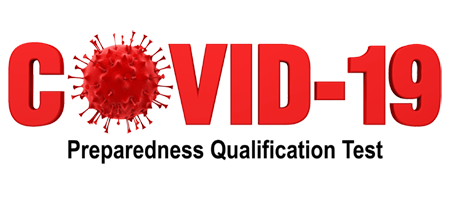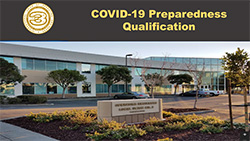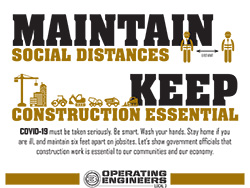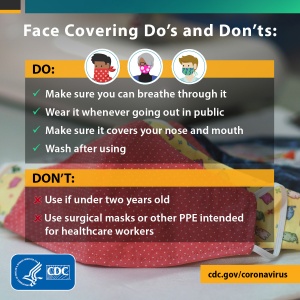COVID-19 UPDATES & RESOURCES
The ongoing health concerns and changing news regarding COVID, are overwhelming for everyone. This resources page offers insight and links to county and state protocols and information that may be helpful during these unprecedented times. Providing a safe environment for our members and there is families is our top priority. Please check back here for new information, as we continue to protect and serve you in these difficult and uncertain times.
More Resources
LOCAL 3 UPDATES
Get the latest updates on office closures, meetings, picnics and more. Click on the tab to get the latest information. These are listed in most recent new first.
COVID-19 Preparedness Qualification & Test
Take the COVID-19 Preparedness course
This course is intended as a supplement to actual hands-on instruction and is designed to teach one or more of the acceptable and recognized methods of performing specific tasks. It is not meant to be, nor should it be considered, an absolute or complete presentation of the procedures and safety measures that relate to these tasks.
Review the qualifications now!
Take the test now!
MAINTAIN Social Distancing
COUNTY RESOURCES
Get the latest updates from the counties most impacted by the shelter-in-place orders. Click on the county button to access the home page.
COVID-19 RESOURCES
Get the latest updates on office closures, meetings, picnics and more. Click on the tab below to get more details and links.
Cloth Face Coverings - CDC Q & A's
CDC – Cloth Face Coverings: Questions and Answers
This link from the CDC is intended to address frequently asked questions about cloth face coverings.
Hawaii Department Of Labor & Industrial Relations
Nevada Department Of Employment, Training & Rehabilitation
Visit the Nevada website now!
Get Nevada Unemployment Insurance Information for Claimants and Employers
Utah Department Of Workforce Services
Visit the Utah website now!
COVID-19 – What to do in the state of Utah if it impacts your employment.
EDD State Of California
Visit their website now!
California is responding to the spread of a respiratory illness caused by a new coronavirus (COVID-19).
WHO Updates
CDC Updates
Visit the CDC website now.
This is an emerging, rapidly evolving situation and CDC will provide updated information as it becomes available, in addition to updated guidance. CDC is aggressively responding to the global outbreak of COVID-19 and preparing for the potential of community spread in the United States.
ECDC Updates
Visit the ECDC website now.
Several countries are now experiencing sustained local transmission of coronavirus disease 2019 (COVID-19), including Europe. The COVID-19 pandemic is rapidly evolving, and outbreak investigations are ongoing. ECDC is closely monitoring this outbreak, providing risk assessments, public health guidance, and advice on response activities to EU Member States and the EU Commission
Traveling Updates And Info
View recent data now!
Global case numbers are reported by the World Health Organization (WHO) in their coronavirus disease 2019 (COVID-19) situation report extern. For U.S. information, visit CDC’s COVID-19 in the U.S.
Updates On Cases In The US
Get more updated information.
CDC is responding to an outbreak of respiratory illness caused by a novel (new) coronavirus. The outbreak first started in Wuhan, China, but cases have been identified in a growing number of other locations internationally, including the United States. In addition to CDC, many public health laboratories are now testing for the virus that causes COVID-19.
How To Protect Yourself And Others




Protective Measures For Person Who Have Traveled Recently
Protection measures for persons who are in or have recently visited (past 14 days) areas where COVID-19 is spreading
- Follow the guidance outlined below (Basic protective measures against the new coronavirus)
- Stay at home if you begin to feel unwell, even with mild symptoms such as headache and slight runny nose, until you recover. Why? Avoiding contact with others and visits to medical facilities will allow these facilities to operate more effectively and help protect you and others from possible COVID-19 and other viruses.
- If you develop fever, cough and difficulty breathing, seek medical advice promptly as this may be due to a respiratory infection or other serious condition. Call in advance and tell your provider of any recent travel or contact with travelers. Why? Calling in advance will allow your health care provider to quickly direct you to the right health facility. This will also help to prevent possible spread of COVID-19 and other viruses.
Basic protective measures against the new coronavirus
Stay aware of the latest information on the COVID-19 outbreak, available on the WHO website and through your national and local public health authority. COVID-19 is still affecting mostly people in China with some outbreaks in other countries. Most people who become infected experience mild illness and recover, but it can be more severe for others. Take care of your health and protect others by doing the following:
Wash your hands frequently
Regularly and thoroughly clean your hands with an alcohol-based hand rub or wash them with soap and water.
Why? Washing your hands with soap and water or using alcohol-based hand rub kills viruses that may be on your hands.
Maintain social distancing
Maintain at least 1 metre (3 feet) distance between yourself and anyone who is coughing or sneezing.
Why? When someone coughs or sneezes they spray small liquid droplets from their nose or mouth which may contain virus. If you are too close, you can breathe in the droplets, including the COVID-19 virus if the person coughing has the disease.
Avoid touching eyes, nose and mouth
Why? Hands touch many surfaces and can pick up viruses. Once contaminated, hands can transfer the virus to your eyes, nose or mouth. From there, the virus can enter your body and can make you sick.
Practice respiratory hygiene
Make sure you, and the people around you, follow good respiratory hygiene. This means covering your mouth and nose with your bent elbow or tissue when you cough or sneeze. Then dispose of the used tissue immediately.
Why? Droplets spread virus. By following good respiratory hygiene you protect the people around you from viruses such as cold, flu and COVID-19.
If you have fever, cough and difficulty breathing, seek medical care early
Stay home if you feel unwell. If you have a fever, cough and difficulty breathing, seek medical attention and call in advance. Follow the directions of your local health authority.
Why? National and local authorities will have the most up to date information on the situation in your area. Calling in advance will allow your health care provider to quickly direct you to the right health facility. This will also protect you and help prevent spread of viruses and other infections.
-Stay informed and follow advice given by your healthcare provider
Stay informed on the latest developments about COVID-19. Follow advice given by your healthcare provider, your national and local public health authority or your employer on how to protect yourself and others from COVID-19.
Why? National and local authorities will have the most up to date information on whether COVID-19 is spreading in your area. They are best placed to advise on what people in your area should be doing to protect themselves.
How To Stay Healthy While Traveling





How To Wash Hands
How To Use A Mask
When to wear a mask:
- If you are healthy, you only need to wear a mask if you are taking care of a person with suspected 2019-nCoV infection.
- Wear a mask if you are coughing or sneezing.
- Masks are effective only when used in combination with frequent hand-cleaning with alcohol-based hand rub or soap and water.
- If you wear a mask, then you must know how to use it and dispose of it properly.
How to put on, use, take off and dispose of a mask:
- Before putting on a mask, clean hands with alcohol-based hand rub or soap and water.
- Cover mouth and nose with mask and make sure there are no gaps between your face and the mask.
- Avoid touching the mask while using it; if you do, clean your hands with alcohol-based hand rub or soap and water.
- Replace the mask with a new one as soon as it is damp and do not re-use single-use masks.
- To remove the mask: remove it from behind (do not touch the front of mask); discard immediately in a closed bin; clean hands with alcohol-based hand rub or soap and water.




